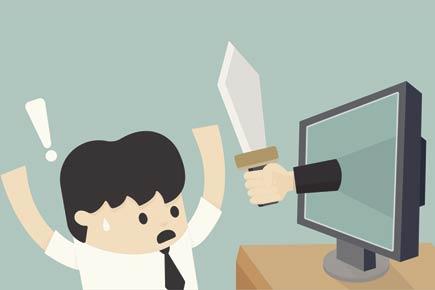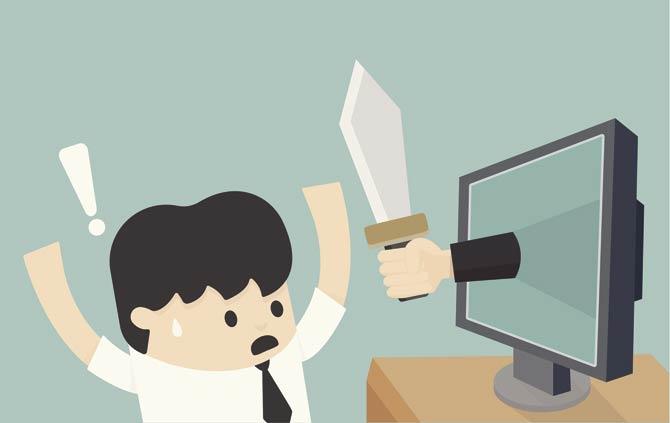The hatred online is scary. Can there ever be a civil discussion or argument on anything these days? Or is everyone now beholden to a digital lynch mob

 The hatred online is scary. Can there ever be a civil discussion or argument on anything these days? Or is everyone now beholden to a digital lynch mob.
The hatred online is scary. Can there ever be a civil discussion or argument on anything these days? Or is everyone now beholden to a digital lynch mob.
It is a thought that has come to millions of us who love going online to plug into what’s happening. But it is becoming more difficult to read, participate and observe a discussion. Because all that is out there is extreme opinions. It is kill, punish, hit, in response to anything that you don’t agree with. And there seems to be a complete unwillingness to read, or understand, or listen to all sides in any discussion. Online extremists first attack the person who has a different opinion, his company, his past, his religion, anything they can get on the personal front. They rarely offer any argument or a convincing reason that supports their point of view.
ADVERTISEMENT
 It is becoming more difficult to read, participate and observe a discussion. Because all that is out there is extreme opinions. It is kill, punish, hit, in response to anything that you don’t agree with. Illustration/Thinkstock
It is becoming more difficult to read, participate and observe a discussion. Because all that is out there is extreme opinions. It is kill, punish, hit, in response to anything that you don’t agree with. Illustration/Thinkstock
Some of it is just bad behaviour combined with ignorance. But lots of it is hatred and prejudice that could manifest itself against anything - a religion, a community, a country, a company or even a set of professionals.
Note the abuse hurled on journalists - from terrorists to presstitutes. Most professions have bad eggs. Think of the doctors who have diagnosed an illness badly and got away with it (there are three really horrific cases in my family) or lawyers who fleece you at times. Would your hateful tweet about the local GP trend? The chances are slim. But attack an Arnab Goswami or someone else, and you are likely to get attention. You could argue that media is a visible profession and journalists’ mistakes are out there for millions of people to see and comment on. Fair enough.
But on issues such as Greenpeace or Teesta Setalvad, the hatred is visceral, corroding and seems so out of proportion.
Is it because a whole generation of Indians is getting exposed to a warped version of history online - though unresearched news articles, morphed pictures and false facts forwarded thousands of times through social media? So there are photos of Pandit Jawaharlal Nehru kissing a woman, being circulated to ask whether we want Children’s Day in his name or that of Dr Abdul Kalam whose picture is with kids. Children’s Day is celebrated on Nehru’s birthday because he was fond of kids and was referred to as Chacha Nehru. Nehru never asked for it, nor did Kalam. In fact, they would be appalled at this debate, so why create this silly argument in the first place. We can always celebrate Kalam’s birthday on some other day.
The other thing that comes across is a lot of the abusive stuff online comes from people not living in India. In fact the overseas ‘Indian’ seems to have very strong opinions on everything to do with India. Considering that they have chosen not to live here, have no idea of the ground reality and don’t have to deal with the issues that most Indians deal with every day, the polite question to ask would be - why spread hatred if you can’t help with a solution?
The India many of us grew up in was poor, dirt poor. However it remained a democracy in most ways, with aberrations like the Emergency. There were fights, arguments, debates but there was decency even while disagreeing with someone. If you did not agree with someone you simply closed the argument politely.
Now we are heading to that point where any dissenting voice, argument, any book, film with a different point of view will be shouted down by the digital mob. This doesn’t speak of an economic superpower in the making. It speaks of an insecure, thin-skinned and immature democracy that is not willing to talk to itself and outsiders about its warts - when the BBC does a documentary on the Nirbhaya case or a Greenpeace activist talks critically about India outside or a TV show tackles uncomfortable social questions. Remember Eleanor Roosevelts’ quote - Great minds discuss ideas; average minds discuss events; small minds discuss people.
We have to ask ourselves then whether we are becoming a nation of small-minded people. Is our sense of self worth so low that any discussion about a problem that we know exists - say rape or caste differentiation - can get us frothing at the mouth? More importantly, the question to ask ourselves as Indians is - will we let a lynch mob, whose only contribution to a debate is a click or a tap on the smartphone, decide which way an argument goes.
The writer is a media specialist and author. Follow her on Twitter at https://twitter.com/vanitakohlik
 Subscribe today by clicking the link and stay updated with the latest news!" Click here!
Subscribe today by clicking the link and stay updated with the latest news!" Click here!







